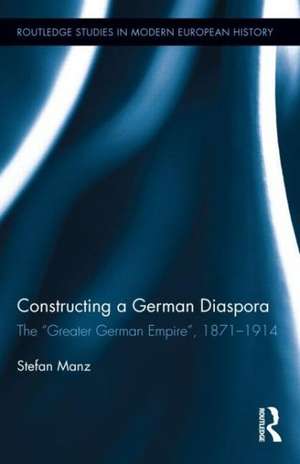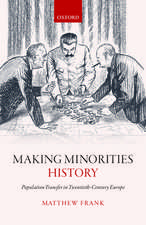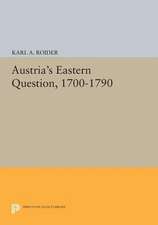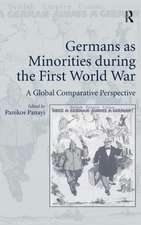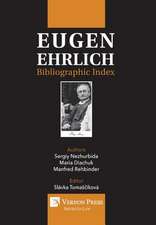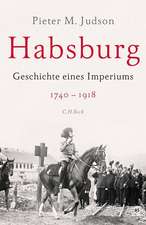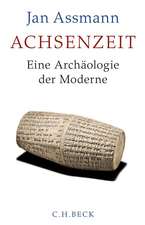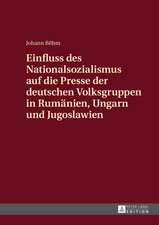Constructing a German Diaspora: The "Greater German Empire", 1871-1914: Routledge Studies in Modern European History
Autor Stefan Manzen Limba Engleză Hardback – 10 iun 2014
It brings together constructivist approaches to ethno-national identity formation and transnationalist approaches to understanding the German Empire within its global entanglements. Based on local sources from a variety of countries, as well as transnational correspondence, the ‘glocal’ perspective adds new insight to existing studies with a geographical focus. A range of case studies serves to depict the mechanics, spread, and nature of nationalist thinking abroad, including colonial Namibia, transnational correspondence of the Central League for German Navy Clubs Abroad, South America, Colombo, and Bangkok, where "Germanness [was] in very good shape", that have never been the subject of scholarly analysis. This book shows the ways in which the ‘Greater German Empire’ did not remain a fictitious construct but became embedded in migrants’ sense of national belonging and ethnic identity.
| Toate formatele și edițiile | Preț | Express |
|---|---|---|
| Paperback (1) | 461.03 lei 43-57 zile | |
| Taylor & Francis – 7 feb 2017 | 461.03 lei 43-57 zile | |
| Hardback (1) | 1115.51 lei 43-57 zile | |
| Taylor & Francis – 10 iun 2014 | 1115.51 lei 43-57 zile |
Din seria Routledge Studies in Modern European History
-
 Preț: 288.80 lei
Preț: 288.80 lei -
 Preț: 341.55 lei
Preț: 341.55 lei -
 Preț: 342.58 lei
Preț: 342.58 lei - 9%
 Preț: 935.39 lei
Preț: 935.39 lei -
 Preț: 311.41 lei
Preț: 311.41 lei - 9%
 Preț: 934.94 lei
Preț: 934.94 lei -
 Preț: 311.47 lei
Preț: 311.47 lei - 18%
 Preț: 1057.09 lei
Preț: 1057.09 lei - 18%
 Preț: 1124.39 lei
Preț: 1124.39 lei - 26%
 Preț: 846.50 lei
Preț: 846.50 lei -
 Preț: 430.37 lei
Preț: 430.37 lei -
 Preț: 369.73 lei
Preț: 369.73 lei - 18%
 Preț: 1056.28 lei
Preț: 1056.28 lei - 18%
 Preț: 1062.98 lei
Preț: 1062.98 lei - 15%
 Preț: 461.03 lei
Preț: 461.03 lei - 26%
 Preț: 820.92 lei
Preț: 820.92 lei -
 Preț: 452.15 lei
Preț: 452.15 lei - 18%
 Preț: 942.65 lei
Preț: 942.65 lei - 18%
 Preț: 1113.12 lei
Preț: 1113.12 lei - 26%
 Preț: 765.19 lei
Preț: 765.19 lei - 26%
 Preț: 766.27 lei
Preț: 766.27 lei - 18%
 Preț: 1113.12 lei
Preț: 1113.12 lei - 26%
 Preț: 764.20 lei
Preț: 764.20 lei -
 Preț: 275.87 lei
Preț: 275.87 lei - 18%
 Preț: 1188.89 lei
Preț: 1188.89 lei - 18%
 Preț: 910.22 lei
Preț: 910.22 lei - 18%
 Preț: 1108.37 lei
Preț: 1108.37 lei - 18%
 Preț: 1120.20 lei
Preț: 1120.20 lei - 18%
 Preț: 1004.20 lei
Preț: 1004.20 lei - 18%
 Preț: 1055.51 lei
Preț: 1055.51 lei - 25%
 Preț: 824.80 lei
Preț: 824.80 lei -
 Preț: 485.40 lei
Preț: 485.40 lei - 26%
 Preț: 821.53 lei
Preț: 821.53 lei - 25%
 Preț: 796.11 lei
Preț: 796.11 lei - 18%
 Preț: 2230.89 lei
Preț: 2230.89 lei - 26%
 Preț: 822.36 lei
Preț: 822.36 lei - 18%
 Preț: 1057.75 lei
Preț: 1057.75 lei - 26%
 Preț: 736.38 lei
Preț: 736.38 lei - 18%
 Preț: 1066.09 lei
Preț: 1066.09 lei - 26%
 Preț: 764.20 lei
Preț: 764.20 lei - 18%
 Preț: 1058.65 lei
Preț: 1058.65 lei -
 Preț: 438.05 lei
Preț: 438.05 lei -
 Preț: 446.32 lei
Preț: 446.32 lei - 18%
 Preț: 703.93 lei
Preț: 703.93 lei - 18%
 Preț: 1116.27 lei
Preț: 1116.27 lei
Preț: 1115.51 lei
Preț vechi: 1360.38 lei
-18% Nou
213.47€ • 221.52$ • 178.43£
Carte tipărită la comandă
Livrare economică 17-31 martie
Specificații
ISBN-10: 0415892260
Pagini: 376
Ilustrații: 2 black & white illustrations, 16 black & white tables, 2 black & white line drawings
Dimensiuni: 152 x 229 x 25 mm
Greutate: 0.64 kg
Ediția:New.
Editura: Taylor & Francis
Colecția Routledge
Seria Routledge Studies in Modern European History
Locul publicării:Oxford, United Kingdom
Public țintă
Postgraduate and UndergraduateCuprins
Introduction 1. German Settlements Abroad 2. Constructing a German Diaspora 3. Protestantism, Nationalism, and Transnationality 4. ‘Solid Bulwarks of Germanness’: The Central League for German Navy Clubs Abroad 5. Diaspora Nationalism under the Microhistorical Magnifying Glass: The Case of the German Community in Glasgow 6. World War I and the German Diaspora Conclusion
Recenzii
"A wonderful book. [...] The range of Manz's research is quite extraordinary and the sensitivity of his analysis does full justice to the range of locations he considers. [...] Stefan Manz's study of the relationship between Imperial Germany and its diaspora presents a mass of fascinating information and sheds new light on every topic it broaches. It is a major achievement."
- Joachim Whaley, University of Cambridge, in Journal of European Studies
"Constructing a German Diaspora is a notable contribution to the growing field of Germans beyond Germany"
- Martin Kalb, Bridgewater College
"This work, one of the best this reviewer has seen in over 30 years, is a model of historical scholarship and stylistic clarity, and belongs in every academic library. Manz covers an enormous amount of ground looking at various locations worldwide, and unpretentiously but deftly draws on contemporary migration theory. Summing Up: Essential."
-Stephen Bailey, Knox College, in CHOICE
"The scope of this study is breathtaking. It presents a highly persuasive thesis, backed by a very broad range of evidence. Manz presents here a very significant contribution to the field, and a model for the study of other diaspora nationalisms."
- Sacha Davis, University of Newcastle, Australia, in H-Nationalism
"This book encourages us to rethink the modes of belonging that informed many German subjectivities during the Kaiserreich."
- H. Glenn Penny, University of Iowa, in German History
"Constructing a German Diaspora is a groundbreaking scholarly contribution that will be respected and influential for years to come. Manz’s task was colossal, but with his careful attention to the material, he has succeeded in pushing immigration studies in new directions...A major achievement."
- Cora Lee Kluge, University of Wisconsin, Madison, in Max Kade Institute Newsletter
"The book is an important contribution to migration studies and the history of Imperial Germany. It can be recommended to a wide circle of readers interested in in the history of Imperial Germany and Germans abroad."
- Georg Wurzer, in Historische Zeitschrift
"Manz provides a uniquely global approach to both nation-building and noisy nationalism. The perspective from the Reich outward and the diasporic communities inward permits fascinating insights based on research in five continents and supported by vivid quotes from nationalists’ writings. Manz skillfully weaves the many strands into a coherent and convincing analysis."
- Dirk Hoerder, Arizona State University (Emeritus)
"Since the 1980s we have seen a reinterpretation of the German diaspora by German professors led by Klaus J. Bade and Dirk Hoerder. We can see the volume written by Manz as a worthy continuation of the efforts of these two leading German historians. Manz has written a major study on the process of diaspora construction in the decades between German unification and the outbreak of the First World War which will prove essential reading for anybody interested in the historical origins of diaspora and transnationalism and in the rise of German nationalism on a global scale."
- Panikos Panayi, de Montfort University, in Immigrants & Minorities
"Manz innovatively links different world regions with each other and with Imperial Germany. It is hoped that Manz’s work, with its pioneering global approach, will stimulate further in-depth research on the creation of regional diasporas and similar transnational studies on migration."
- Bettina Brockmeyer, Bielefeld University, in Bulletin of the German Historical Institute London
"Manz's novel approach brings out the interplay between 'nation' and 'diaspora' - both symbolically and spatially. The transnational perspective allows Manz to partly unhinge the analytical separation between metropole and periphery and regard both as a shared and permeable space in which migration and nation are being negotiated. In this perspective lies the innovative and ambitious claim of the monograph."
- Vierteljahresschrift für Sozial- und Wirtschaftsgeschichte
"The book is a welcome and well-founded discussion of historical efforts to foster active diaspora politics. [It] constitutes an innovative nexus of new approaches in migration history and nationalism research with a global reach."
- Moritz Glaser, University of Kiel, in H-Soz-Kult
"The study will be an indispensable standard work for years to come."
- Klaus Dittrich, Hong Kong Institute of Education, in geschichte.transnational
“An extremely thorough study and a very timely one, bringing together issues of identity, belonging and nationhood in a truly global context. […] considers the concept of diaspora as a much more appropriate and significant aspect of German history than has heretofore been acknowledged”
– Britta Schilling, University of Utrecht, in American Historical Review
"Constructing a German Diaspora impresses with the scope and detail of its research, as well as the persuasiveness of its central arguments. It stands out as a monograph taking a global approach to the German diaspora and its considerable influence on politics in Imperial Germany"
– Robert Kelz, University of Memphis, H-Net
"Manz has written an important book based on extensive source material. […] impressive."
- Björn Hofmeister, Berlin, in Neue Politische Literatur
Notă biografică
Descriere
German unification in 1871 had a significant impact on those Germans who found themselves living outside, or migrating across, the borders of the newly founded Empire. Migrants’ redefined their relationship with their country of origin and were increasingly represented as outposts of ‘Germanness’ whose ethnic links with the mother country had to be preserved for their own and the Empire’s benefits. Germans worldwide underwent a redefinition from geographically scattered and disparate groups to being a unified transnational ‘community of spirit’. This book is the first to specifically focus on the construction of an imagined homogeneous and Reich-focused diaspora through public discourse.
It brings together constructivist approaches to ethno-national identity formation and transnationalist approaches to understanding the German Empire within its global entanglements. Based on local sources from a variety of countries, as well as transnational correspondence, the ‘glocal’ perspective adds new insight to existing studies with a geographical focus. A range of case studies serves to depict the mechanics, spread, and nature of nationalist thinking abroad, including colonial Namibia, transnational correspondence of the Central League for German Navy Clubs Abroad, South America, Colombo, and Bangkok, where "Germanness [was] in very good shape", that have never been the subject of scholarly analysis. This book shows the ways in which the ‘Greater German Empire’ did not remain a fictitious construct but became embedded in migrants’ sense of national belonging and ethnic identity.
